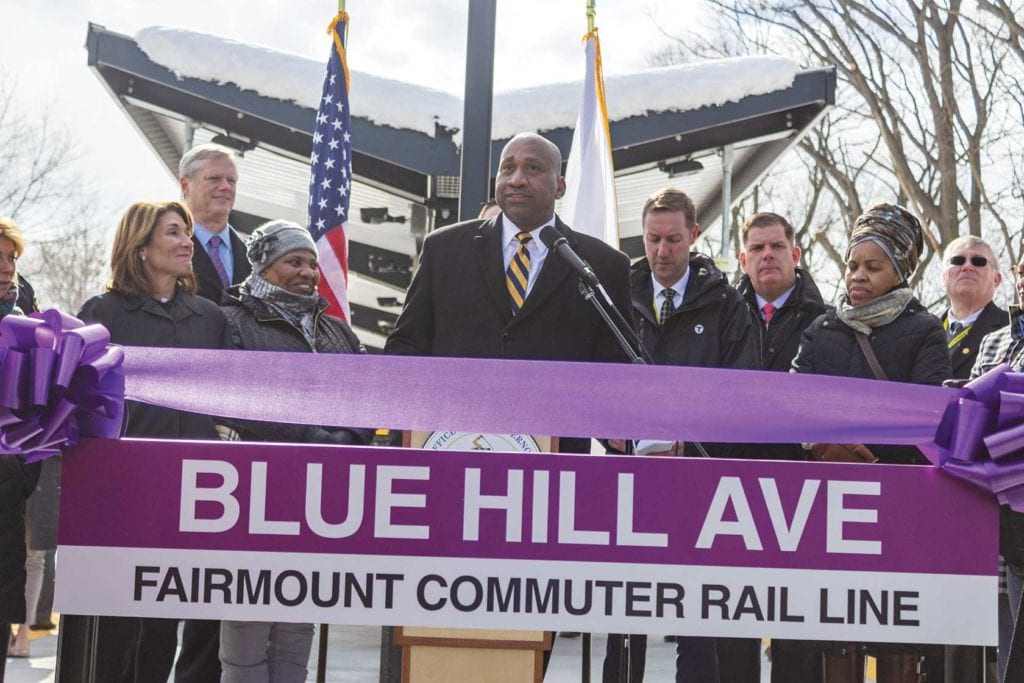
For years, trains on the Fairmount Line passed by Mattapan Square, speeding commuters to South Station while bypassing the busy commercial district. Last week, community members and elected officials celebrated as the brand-new commuter rail station at Blue Hill Avenue near Mattapan Square officially opened, a move many say will shorten commute times for neighborhood residents.
While trains on the Fairmount Line actually began stopping at the station, located between Cummins Highway and Blue Hill Avenue, on Feb. 25, a ribbon-cutting ceremony to commemorate the historical opening was held on Wednesday, March 6.
State Rep. Russell Holmes grew up just a few streets over and has advocated for the construction of the station since winning election eight years ago.
“This is where I grew up, and I know the difference this will make in everyone’s life,” Holmes said.
Before the opening of the new station, residents of the area would watch the commuter rail trains go past without being able to board. Instead, to get downtown, they would have to use a combination of buses, the Mattapan trolley and the Red Line, and commutes could take more than an hour. With access to the Fairmount Line, which operates between Readville and South Station, that trip is cut down to just 23 minutes.
“It will give you an hour of your life back in travel every day,” Holmes said.
The station is located within the Zone 1A fare zone, so the trip costs $2.25, the same price as a subway ride.
Elected officials at the opening ceremony expressed hope that the new station would both provide transit equity in the majority people of color Mattapan neighborhood and bring more people and business into the area.
“When I think about the kids in this neighborhood and the people who have lived here for generations,” said Lieutenant Governor Karyn Polito, “the opportunity to perhaps access a paid high school internship for a student here, or for this community to get to jobs in a more convenient and more efficient fashion, is a really great opportunity that you so deserve.”
The station was constructed over two years and cost $16.9 million. It includes ramps down to a central platform from both Cummins Highway and Blue Hill Avenue and is equipped with shelters, canopies, security equipment and electronic service messaging signage.
It is the fourth and final station opened along the Fairmount Line since 2012 and is part of a $130 million series of investments in the line that also included bridge and infrastructure work.
MBTA General Manager Steve Poftak explained that the MBTA is currently working through a five-year, $8 billion investment plan to improve its infrastructure, vehicles and equipment.
“The T is in the process of transforming itself into a system that is more robust and more reliable by making investments like this in improving the system,” he said.
State Rep. Dan Cullinane expressed his happiness that the long process of advocating for a new station on the Fairmount line had finally paid off.
“This is what a victory in the fight for transit equity looks like,” Cullinane said. “This is a big win for all of Mattapan.”
Holmes said the next push will be for greater frequency on the commuter rail line, which runs trains only every 40 minutes during peak rush-hour times. During the administration of former Gov. Deval Patrick, state officials committed to converting the Fairmount Line into a rapid transit line with frequency similar to the system’s subway lines. To accomplish that, the MBTA would need locomotives or self-powered cars capable of accelerating and braking faster than the standard commuter rail trains currently running.
“We need trains that will run just on this line,” Holmes said. “If we have more trains, we’ll have more riders.”






